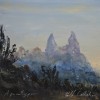 According to major news stations, approximately 3% of America's population was convinced the rapture might occur on May 21, 2011, due to the prophecy of a Christian evangelist, radio personality, and madman. A day later, and the apocalypse hasn't come—surprise!—which means you still have a chance to hear Bill Callahan's latest, aptly-named album before the world actually ends.
According to major news stations, approximately 3% of America's population was convinced the rapture might occur on May 21, 2011, due to the prophecy of a Christian evangelist, radio personality, and madman. A day later, and the apocalypse hasn't come—surprise!—which means you still have a chance to hear Bill Callahan's latest, aptly-named album before the world actually ends.
Callahan has been releasing music for 20 years now, and Apocalypse isn't likely to change minds for those not interested by now. It is a fine addition to his catalog, though—I have played it every week since I heard it back in March, and to my ears, this is the best album he has made since his final full-length as Smog, 2005's A River Ain't Too Much to Love. As usual, this is a subtle progression for Callahan that contains small tweaks to his approach—seven intimate songs in 40 minutes that are captured well by the serene, scenic landscape on its cover.
My favorite aspect of the album—like Callahan's last full-length, 2009's Sometimes I Wish We Were an Eagle—is the total richness of the performances captured. Apocalypse sounds flat-out gorgeous, among the best production and mastering jobs this year. The album was supposedly recorded live in the studio, and the production reflects that: there's a gritty, one-take-or-bust character to the songs that is urgent, impassioned. Details abound in the mix, whether the echo of Callahan's vibrating acoustic guitar strings; the howl and strum of his electric; the gravity of his nuanced baritone; or his ensemble's accompaniment on strings, banjo, drums, and other subtle flourishes. The whole thing is a joy to listen to, regardless of whether the songs themselves are any good.
Luckily, the songs are on-point more often than not. The earthy production lends itself well to a set of seven tunes that sprawl and stretch out, with less concision than Callahan typically seems to shoot for. His lyrics dance around vaguely apocalyptic topics, though often on a personal level, such as the struggles in a relationship. "Where has my baby gone? / She was not a weed, she was a flower," he mourns. At other points, he centers on humility and the value of self-discovery. "My, my, my apocalypse," Callahan intones, "I realized I had said very little about ways, or wheels, or riding for the feeling." His lyrics are just vague enough to avoid being pinned down with specific meaning, but it's tough not to feel their impact all the same. In the same song, he concludes: "Leaving is easy when you've got someplace you need to be"—perhaps the charm is that it's impossible to tell how confident he really is in that assertion.
At one point, Callahan turns his attention outward to his home country. Like many Americans, he struggles with how to interpret recent events and our overall state of life. Should he feel proud and patriotic? Embarrassed? Angry at leaders who made decisions to stay at war? Or should he simply shrug it off with a self-deprecating laugh? Callahan is bright enough to know not to place all his eggs in one basket: emotions are complex things, as is our country, and his lyrics on "America" are simultaneously reverent and critical, witty and unknowing. In the end, he reverts inward again, knowing that when he can't control his surroundings, or the people in his life, that he can always control himself:
One fine morning, I'm gonna ride out
Just me and the skeleton crew
We're gonna ride out in a country kind of silence
Fair enough—if Apocalypse is his parting shot, it's a bulls-eye.
Samples:
Read More


